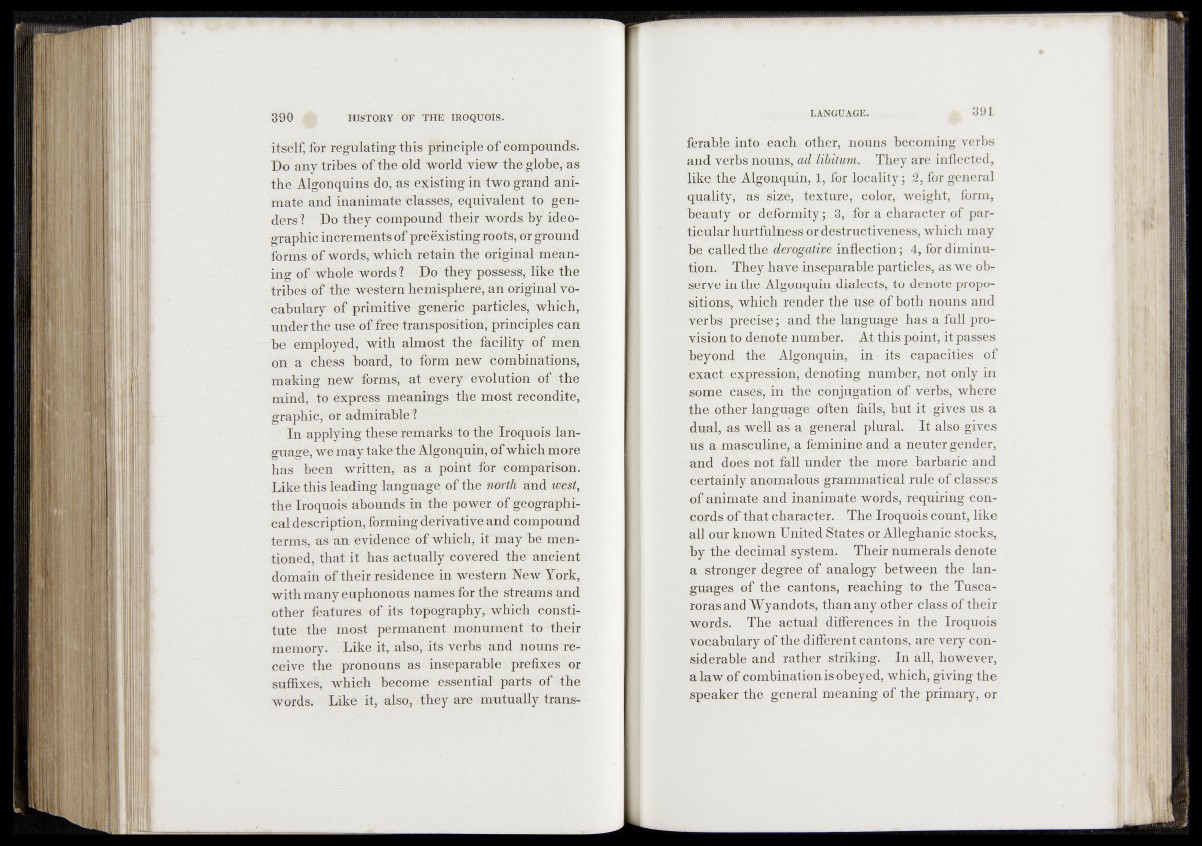
itself, for regulating this principle of compounds,
Do any tribes of the old world view the globe, as
the Aigonquins do, as existing in two grand animate
arid inanimate classes, equivalent to genders
f Do they compound their words by ideographic
increments of preexisting roots, or ground
forms of words, which retain tb,e original meaning
of whole words ? Do they possess,, like the
tribes of the western hemisphere, an original vocabulary
of primitive generic particles, which,
under the use of free transposition, principles can
he emplqpdj with almost the facility of men
on a chess board, to form new combinations,
making new forms, at every! evolution of the
mind, to express meanings the most recondite*
graphic, or admirable T \
Tn applying these remarks to the Iroquois language,
we may take the Algonquin, of whichmore
has been written,., as a point for comparison.
Like this leading language of thh wnrt/t and
the Iroquois abounds in the power of geographical
description, forming derivative and compound
terms, as an evidence of which, it may be mentioned,
that it has actually covered the antdeht
domain of their residence in Western New ^prk,
with many euphonous names for the streams and
other features of its topography, which Constitute
the most permanent monument to their
memory. Like it, also, its verbs and nouns receive
the pronouns as inseparable, prefixes or
suffixes, which become essential parts of the
words.
ferable into each other, nouns becoming verbs
and verbs nouns, ad libitum. They are inflected,
like the Algonquin, 1, for locality; 2, for general
quality, as Size, texture, color, weight, form,
beauty or deformity ;: „3, for a character of particular
hurtfulhessor destructiveness, which may
be called the deppgatfye inflection; 4, for d iminu-
tion. They have inseparable particles, as we obr
serve in the. Algonquin dialects, to denote propositions,
whi^p render the use, of bath nouns and
verbs precise ; and the language has a full pror
vision to denote number. At this point, it passes
beyond the Algonqqin, in ' its • capacities of
exact expression, denoting number, not only in
some eases, in the conjugation* of verbs, where
the-other language: .often fails,;|)ut it -gives us a
dual, as well as«a general plural.' It also gives
us a masculine, a feminine and a neuter gender,
and does not'fafl under!; the more barbaric and
certainly anomalous grammatical rule of classes
of animate and inanimate words, requiring concords
of that character,.'.- The Iroquois count, like
all our known United States or Alleghanic stocks,
by the decimal system. Their numerals denote
a stronger degree of analogy between the languages
of the cantons> reaching to the Tusca-
rorasand Wyandots, than any other class of their
words. The actual differences in the Iroquois
Vocabulary of the different cantons,-are very considerable
and rather striking.. In all, however,
a law of combination is obeyed, which, giving the
Speaker the general meaning of the primary, or